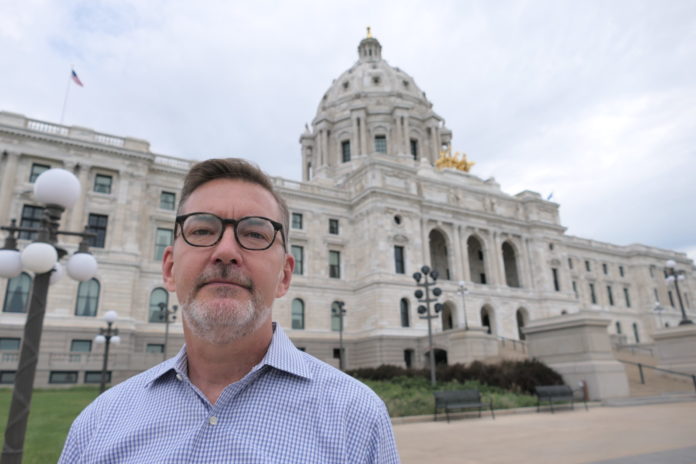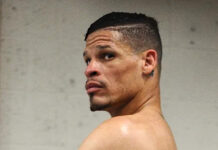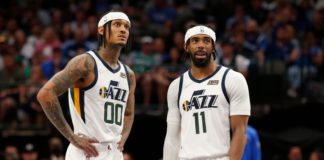
While advocating for the creation of a local human rights commission last summer, Brion Curran shared her concerns about being visibly gay with government leaders in Vadnais Heights.
“I was afraid to hang a pride flag at my house,” Curran said. “I thought in my community that wouldn’t be well received, and I could be targeted [or] potentially be a target of violence or some other kind of discrimination.”
Curran said city officials were not receptive. Few city council members looked engaged, and the city ultimately decided not to pursue the commission. She said this experience and watching videos of state legislators across the country discuss potential anti-trans legislation showed her the need for stronger LGBT representation in government.
She decided to run for the Legislature in District 36B in the east metro suburbs, joining 10 other out LGBT candidates in what is believed to be the largest crop of out gay candidates in state history.
“Oftentimes there’s no one in the room who can speak on behalf of the community,” Curran said. “And even when we do have allies and strong allies who are willing to step up, it really doesn’t seem like that message is taken seriously.”
The historic number illustrates a paradoxical moment for the LGBT community: Broadening social acceptance across many parts of the United States running headlong into emergent political and legal dangers.
Earlier this year, a bill was introduced in the Minnesota Legislature that opponents feared would force teachers to out gay students to their parents, while another would ban trans girls from competing with other girls in school sports.
In March, Florida’s legislature passed the “Don’t Say Gay” law prohibiting classroom discussion on sexual orientation and gender identity.
In June, U.S. Supreme Court Justice Clarence Thomas wrote that cases guaranteeing the right to same-sex marriage and relationships need to be reconsidered due to their reliance on a what he believes is a dubious constitutional right to privacy.
“A lot of people think Minnesota is safe from things like that,” Curran said. “But we’re just a few seats away from having these bills come back up again in Minnesota and having rights stripped away, just as we’ve seen in places like Florida.”
During Minnesota’s recent legislative session, multiple school-related bills were introduced that advocates said would be harmful to the LGBT community. They are part of more than 300 anti-LGBTQ+ bills introduced across the country in 2022, according to the Human Rights Campaign.
For instance, in Minnesota, Senate Republicans worked to advance the “Parents Bill of Rights,” a package of bills meant to increase curriculum transparency, particularly when it comes to topics related to gender, race and sexuality. Opponents said parts of the package could harm LGBT youth by potentially forcing teachers to out students to their parents and increasing censorship.
Erin Maye Quade, a former DFL House member who is running to represent Senate District 56 in the south metro, said electing lawmakers from the LGBT community provides stronger opposition to harmful proposals.
“Often when anti-LGBT legislators talk about our community, they demonize and dehumanize us. When we’re in the room and at the table, it’s so much harder to do that,” said Maye Quade, who is running in a DFL primary against Justin Emmerich.
If elected, some candidates would break new ground. Leigh Finke, who is running in the House District 66A DFL primary against Dave Thomas in St. Paul and inner ring suburbs, would be the first out trans lawmaker in Minnesota. Maye Quade would be the first Black woman and first out lesbian to serve in the state Senate
Sen. Scott Dibble, who represents District 61 in Minneapolis, said visibility of LGBT candidates will also send a different message to LGBT youth, who are the focus of many proposed policies.
“The debate — especially around trans youth and their ability to go to school and be who they are — is extremely damaging to [LGBT youth],” Dibble said. “We need to counteract that so that they can know that they are very much a part of Minnesota and they are needed and wanted.”
While political threats abound, candidates said broadening social acceptance in recent years is part of the reason more LGBT people feel comfortable embracing their identity while running for office.
Breaking these barriers is not new in Minnesota. State Sen. Allan Spear came out in 1974 during his third year in office, making him one of the first openly gay legislators in the country. In 2012, Minnesota voters rejected a constitutional amendment banning gay marriage, after which the Legislature legalized gay marriage in 2013.
“Levels of societal acceptance of LGBT people have only increased over time,” said Dibble, who first ran for office as an openly gay man in 2000. “And people just feel much, much more comfortable stepping up and offering themselves for public service and being out and open and authentic.”
Candidates find support amongst each other.
Curran said the candidates keep in touch through a group chat and phone calls. They talk about everything from logistics of campaigning to personal lives. She said the support from her community helped her feel secure in running.
When Curran finally made the decision to run, she hung a pride flag outside her Vadnais Heights home.
“I have some neighbors that put theirs up, too,” Curran said. “I think it really just shows that we have to show our own community that we’re inclusive because the city wasn’t interested in doing that.”







